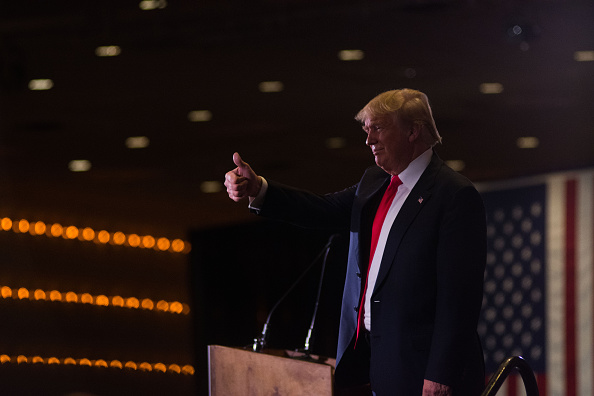
Feb. 20, 2016, will be seen as the day Donald Trump officially became the establishment candidate of the Republican Party. Nevada sealed the deal.
Just looking at the exit polls from South Carolina, it’s really hard to see it any other way. Trump won across the board. The establishment talking point before Saturday (and I was one who offered it multiple times) was that Trump was winning only among lower-educated, blue-collar, disaffected voters. Well, not any longer. Trump did well among Republicans with college degrees and higher incomes. And it doesn’t end there. Evangelical voters? Trump won them. Non-evangelical voters? Yep, won them, too. Folks who voted for Mitt Romney or who voted for Newt Gingrich in South Carolina in 2012? They supported Trump. Veterans and non-veterans, seniors and young voters all supported The Donald.
Sure, you can point to Marco Rubio’s distant second place as a sign that what was the establishment wing of the party has some life left in it, but aside from the three South Carolina counties that went for Rubio, Trump won the rest.
And while divine intervention may lead to a Rubio comeback, right now the gravitational pull, the center of the Republican Party, including the establishment, is on Trump’s side.
Trump is polling ahead, in some cases significantly, in almost every Super Tuesday state. Unless candidates start dropping out, on March 2 we could very well wake up and find that Trump has run the table. If this happens, he will have won not in a slog but a slam-dunk. The Republican National Committee set up the process to have an early nominee, and an early nominee they will have.
What the Internet did to newspapers, what Uber did to taxis, what Airbnb did to the hotel industry, Donald Trump did to American politics (and I should say Bernie Sanders isn’t doing a bad job on the other side of the aisle). In Silicon Valley they call it dynamic disruption. Just look at the all the traditional predictors of who will be the nominee, and Trump raised a digit to every one of them.
Endorsements? Once the gold standard of the political elite are now next to meaningless. A former president, a sitting governor, a senator, even a former beloved first lady all endorsed candidates with little or no impact on the race.
Money? For all the handwringing over big money in politics, super PACs have had little impact on results. The candidate who amassed a “shock and awe” war chest of more than $150 million dollars between his campaign and super PAC placed 5th, 4th and a distant 4th and dropped out of the race before Super Tuesday.
Advertising? Political advertising has had less impact this year since when Eisenhower rolled out that catchy “I Like Ike” jingle in the ‘52 campaign. While the Rubio super PAC ads clearly damaged Chris Christie in the New Hampshire primary, traditional advertising has mostly been a non-factor in the results. Trump has spent less on advertising than any of the top candidates.
The Acela Corridor? Powerless. At the bar at the Palm in Washington, D.C., over breakfast at the New York’s Regency hotel, “smart” men and women shake their heads in disbelief. How could this happen?
But even there, at Ground Zero of the establishment, they are also coming around to the realization that Donald Trump could very well be the nominee of their Republican party. And so the rationalizations begin—“He’s businessman, not an ideologue.” “He’s a deal maker.” “Listen the guy is going to move to the center faster than Nixon did in ’68.” “He’s a master marketer, he doesn’t really believe in any of this.” And of course, “Well, he’s better than Hillary Clinton.”
After consecutive losses by John McCain and Mitt Romney, the party wants to win. The Republican National Committee’s post-2012 election autopsy argued for broadening the Republican/conservative coalition, reaching out to Hispanics and women. Trump takes a different approach. He argues that the party isn’t bold enough, that it is too politically correct. He is betting that disaffected conservative, blue collar, evangelical voters who wrote off Romney and McCain as too timid will flock to the polls in unprecedented numbers. But he also believes that Hispanics, African Americans and other minorities will agree enough with his bullish, take-no-prisoners view of “Making America Great Again” that they will join him to disrupt the electorate in a way that has yet to be seen.
Donald Trump believes he can build a bigger GOP tent—just not the one designed by the establishment or at least the establishment prior to last Saturday. And while some may continue to be in denial, start looking for more Trump bumper stickers at the local country club.
More Must-Reads from TIME
- Why Trump’s Message Worked on Latino Men
- What Trump’s Win Could Mean for Housing
- The 100 Must-Read Books of 2024
- Sleep Doctors Share the 1 Tip That’s Changed Their Lives
- Column: Let’s Bring Back Romance
- What It’s Like to Have Long COVID As a Kid
- FX’s Say Nothing Is the Must-Watch Political Thriller of 2024
- Merle Bombardieri Is Helping People Make the Baby Decision
Contact us at letters@time.com